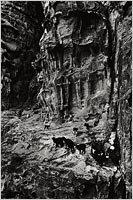|

...a
tale from journals....
In the Fall of '81, Abu Msallam invited me to help him accustom
his young three-year-old camel, Ga'ood, to a human rider.
In the American West this activity is called "breaking-in"
an animal. Perhaps you possess TV images of cowboys in a corral
or a rodeo riding a wildly bucking horse as humans are tossed
into the air and holding on for dear life with one hand. Well,
believe me, the camel is just as stubborn and ferocious as
a horse in his determination to be rid of the human burden
on his back.
For
the better part of a week, Msallam led us on long "walks"
with a 5-meter rope tied around the camel's muzzle. In the
beginning, his younger brother Dhaif Allah joined us for the
adventure. Holding a similar rope he triangulated with Msallam
against Ga'ood. I will carry to my grave an image of the two
of them: pulled and braced like tent-stakes with the sand
piling up their shins in waves or furrows as they attempted
to subdue Ga'ood. I sat on the camel's rump and gripped for
dear mercy a burlap sack looped around his little adolescent
hump, cinched from underneath his belly. We spent hours and
days walking more often thrashing up and down the valley.
The
work was exhausting. Bouncing between Ga'ood and the ground,
I accumulated a goodly number of scrapes and cuts and bruises
which, when you live outdoors, you generally ignore. But one
evening I discovered bloodstain on my robe and after some
searching, I found a dry scab at the base of my spine. This
wound was bewildering: I could not remember hurting myself
in that location whereas every other bruise and cut had a
memorable spin to it. I puzzled over the matter for days.
Weeks
later, in the relaxed gathering of a group of men, I was invited
to narrate the tale of subduing Ga'ood. I mentioned in passing
my discovery of the wound. Well... a voice from the darkness
quipped "hagfan," and all of a sudden each and every
one of the men present broke into chortles, chuckles, and
laughter. They were rolling back on their elbows, some with
tears in their eyes. I was dumbfounded. And my chagrin only
fueled their humor.
"Hagfan"
means "You who or that which is dried up or shrivelled."
In that instant though, I did not have a dictionary. Was this
a familiar name for my injury? Something that every young
boy experiences in the course of growing up or was I being
"hoisted on my own petard?" The butt of a joke?
Clearly, I was being royally teased. Msallam finally discovered
his composure and took it upon himself to explain. "You
see, Said, you wanted to learn our ways. Now we have gone
and siphoned off the last drop of your American blood. That
part of you is now all dried up. You are one of us now."
People
around the world often use the language of "blood"
to describe kinship and brotherhood. But as this incident
shows, even illiterate folk recognize the mere convenience
of this vocabulary. The Zalabi clan did not for a moment think
that they had really managed to go where medicine has failed
to go before, to separate ethnic strains of blood one from
the other. They did not think they had erased my American
mannerisms, accent, and bizarre thinking. But they recognized
that we had crossed a threshold of experience that made me
kin in a special special and acceptable way. We now shared
a bond that made us more together than apart, less alien,
less foreign. Because of the humorous fallacy of their language
and the fact that everyone took it tongue-in-cheek, my transformation
was clearly mental, or figurative. With the strength of our
collective imagination, we had fabricated a new reality and
way of thinking that included fraternity, trust, utility,
and playfulness. Brotherhood is imaginable.
©2001
Said Nuseibeh
|







